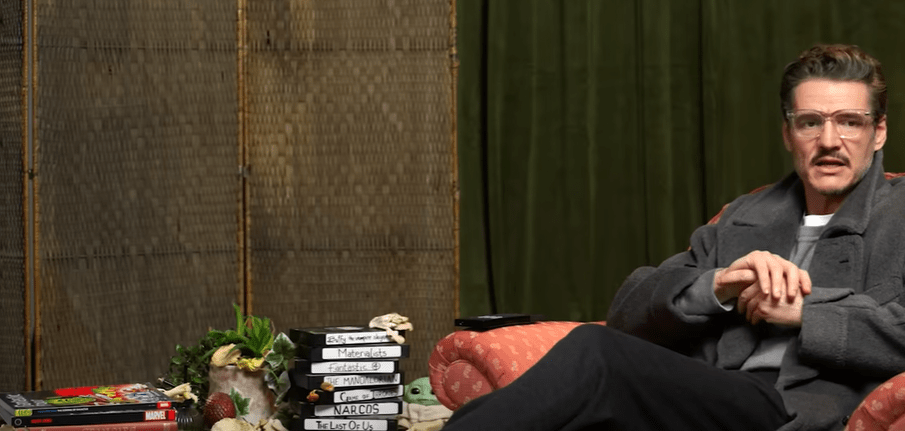Pedro Pascal – Personal and Professional Overview
| Category | Detail |
|---|---|
| Full Name | José Pedro Balmaceda Pascal |
| Known As | Pedro Pascal |
| Birthdate | April 2, 1975 |
| Age | 50 |
| Birthplace | Santiago, Chile |
| Nationality | Chilean-American |
| Notable Roles | The Mandalorian, The Last of Us, The Fantastic Four |
| Professions | Actor, Producer |
| Active Since | Late 1990s |
| Recent Cover Feature | Vanity Fair July/August 2025 |

Pedro Pascal’s Vanity Fair cover in recent days has created the kind of buzz that is typically saved for unexpected album releases or award season scandals. However, this attention seems very well-deserved. Instead of flattering for fame, the work paints a vivid picture of a man still coming to terms with his past while balancing expectations from the present.
Pascal is not seeking relevance at the age of fifty. He is evolving into a much more uncommon actor whose career is reaching its zenith later, not in spite of age but as a result of it. Pascal provides more than just witty soundbites in the Vanity Fair interview, which was held in Notting Hill over cocktails and shared mezze. He talks about gratitude, loss, and the bittersweet irony of succeeding after almost giving up.
When Pascal was struggling to make ends meet in Brooklyn, he had considered giving up acting years ago. He considered attending nursing school or even becoming a theater teacher. Why didn’t he? a network of devoted family members and friends who helped him remember the dream he had been fostering since he was a young child. Javiera, his sister, who is currently a producer at Amazon Studios, is renowned for not letting him give up. She would insist, “You’re too good.” People like Sarah Paulson literally stepped in when the money ran out, lending him her per diems and her sister’s car.
Fans of Hollywood underdog stories may recognize this backstory, but the Vanity Fair profile lends it new significance. It’s a story about care as much as it is about tenacity. The magazine creates a gripping emotional arc through clever storytelling, explaining why Pascal’s appeal transcends his acting prowess and facial symmetry. He is a symbol of something very human: a person who achieved wealth through hard work rather than speed.
Pascal takes readers on a journey through both professional and personal highs and lows through a series of insightful, occasionally humorous reflections. He remembers Verónica, his mother, who committed suicide when he was 24. He claims that her passing almost destroyed him. But it also served as the emotional foundation for the fortitude he now so eloquently exhibits on screen. “Whether we like it or not, we’re bonded,” Pascal said quietly, taking the writer’s hand during the interview when she unexpectedly revealed that her mother had also committed suicide at a nearby university.
Even though that type of moment doesn’t neatly fit into a soundbite, it perfectly captures the tone of the entire feature—sincere, surprising, and incredibly relatable. Pascal is not made into the “daddy of the internet” by Vanity Fair. His co-star on Last of Us, Bella Ramsey, actually actively disavows the term. She lovingly refers to him as “Pedge” and expresses worry that such terms oversimplify a complex individual like Pascal.
However, public opinion frequently moves at its own pace. Designers are lining up to dress him in lipstick-red Valentino or Saint Laurent boots, fans have dubbed him “Zaddy,” and he seems to exude a certain kind of magnetism that’s difficult to create when he appears on stage at SNL50 or at the Met Gala. According to Vanessa Kirby, that presence results from his “immense vulnerability.” People feel safer around him because he doesn’t hide who he is, she says.
The Pedro Pascal phenomenon seems especially advantageous from a societal perspective. His warmth and obvious imperfections provide something unique in a time when celebrity culture is frequently fueled by carefully manicured perfection. He admits to crying easily, questions his own composure, and chuckles at his reputation as a sex icon. His self-assurance is derived from experience, which he has gradually accumulated and which has been molded by both kindness and adversity.
His emotional transparency is highlighted in Vanity Fair’s article, which reflects broader cultural changes regarding masculinity. Spike Jonze, who recently helmed Pascal in a striking Apple ad, notes that Pedro exemplifies what viewers demand these days from male characters: tenderness, integrity, and happiness without boast. Without a performance or lecture, it’s a reimagining of masculinity. As the media continues to reevaluate traditional gender portrayals and redefine who gets to be both strong and sensitive, that change is especially relevant.
The feature looks at his increasingly varied career choices in addition to his character. He recently finished Fantastic Four, is set to start Avengers: Doomsday, and is the lead in Eddington, Ari Aster’s bizarre psychological drama. His range is demonstrated by these roles, which range from emotional complexity to superhero elasticity. They make it apparent that directors are taking notice of Pascal’s growing versatility and that he is no longer stereotyped as the tough protector.
By including allusions to Pascal’s support of his transgender sister Lux and his open backing of humanitarian causes such as Gaza, the Vanity Fair article positions Pascal among an increasing number of celebrities who are prepared to take sides. Though dangerous in some fields, this action reflects a significant cultural shift in which remaining silent is no longer the best course of action.
Pascal considers his 50th birthday as the interview comes to a close. He acknowledges that he approached it fearfully, feeling all of a sudden more exposed. Nevertheless, he and the author raise a toast, clinking glasses and exclaiming “Abso-fucking-lutely” to the upcoming decade. A man who faces the next chapter with heart and humor makes a simple gesture that has a powerful impact.

